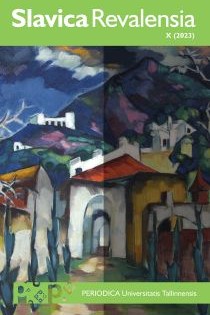Контуры одной традиции: «Ариец», «семит» и природа (Вокруг полемики Александра Блока и Акима Волынского об иудаизме Гейне) [Outlines of a Forgotten Prejudice: “Aryans,” “Semites,” and Nature (The Polemics of Alexander Blok and Akim Volynsky Concerning Heine’s Judaism)]
DOI:
https://doi.org/10.22601/SR.2023.10.03Keywords:
20th-Century Russian Literature, Alexander Blok (1880—1921), Akim Volynsky (1861—1926), Georg Wilhelm Friedrich Hegel (1770—1831), Heinrich Heine (1797—1856), Edgar Quinet (1803—1875), Ernest Renan (1823—1892), Judaism, History of IdeasAbstract
At the end of 1919, literary critic Akim Volynsky and poet Alexander Blok exchanged polemical remarks about Heinrich Heine’s attitude towards Judaism. In the course of this debate, one strange thesis arose, expressed by Volynsky and fully supported by Blok: the Jews, compared to the Aryans (they were talking about both religious and racial differences), turn out to be in their worldview indifferent to nature. An attempt to find the genesis of, and to comment on, this idea, strange for today, expressed by a prominent Russian literary critic and outstanding poet, leads the researcher to Hegel’s philosophy of history, its articulations by some of his readers and listeners (including Heine himself), the history of French thought of the 19th century, in particular to the philosophy of religion of Edgar Quinet and the history of Semitic languages written by Ernest Renan, as well as numerous echoеs of the deliberations of Renan (who canonized for European culture the idea of the indifference of Jews to nature) in the history of Russian modernism (Dmitry Merezhkovsky, Vyacheslav Ivanov, Vasily Rozanov). The outlines of this now almost forgotten intellectual tradition, without which it is impossible to understand some texts in Russian modernism, are the subject of this article.
Downloads
Published
Issue
Section
License
Copyright (c) 2023 Slavica Revalensia

This work is licensed under a Creative Commons Attribution-ShareAlike 4.0 International License.

